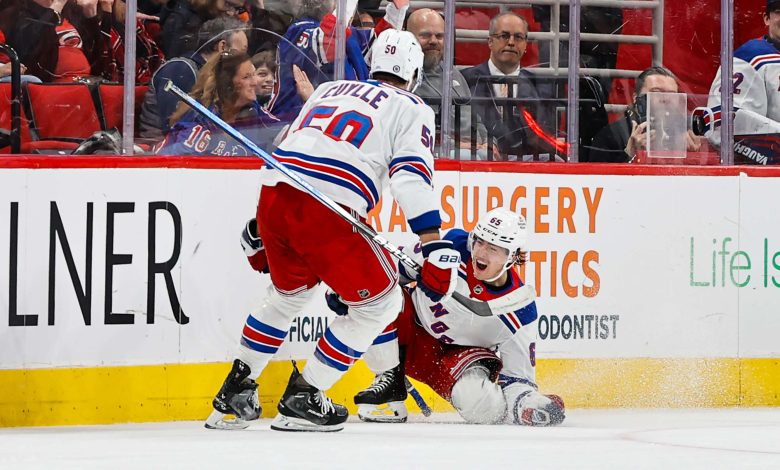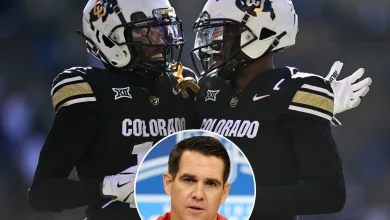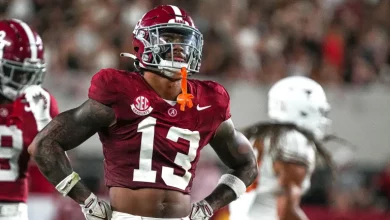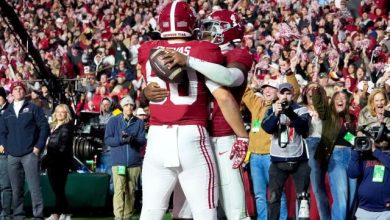Takeaways: Rangers kept scoreless in disheartening loss to Carolina

The New York Rangers suffered a gut-wrenching 3-0 loss to the Carolina Hurricanes, a game that saw them unable to find the back of the net despite a solid effort in stretches of the contest. The defeat left the Rangers with a sour taste in their mouths, as they struggled to solve the stingy defensive system of the Hurricanes while also failing to generate consistent offense. Let’s break down some key takeaways from this tough loss.
1. Offensive Woes: A Missed Opportunity
The most glaring issue in this game was the Rangers’ inability to score. They created some opportunities but couldn’t capitalize on any of them. The Hurricanes, despite not playing their best game, found ways to limit the Rangers’ high-danger chances. New York’s offense, which has been inconsistent at times this season, seemed to lack the urgency needed to break through Carolina’s defense.
A big part of the Rangers’ offensive struggles came from their inability to generate sustained pressure in the offensive zone. Often, the team would gain the zone, but they weren’t able to maintain puck possession long enough to wear down the Carolina defense. In contrast, the Hurricanes’ forecheck was relentless, forcing turnovers and limiting the Rangers’ time on the puck.
Another key factor was the Rangers’ power play, which came up empty on its chances. Special teams have been a mixed bag for the Blueshirts this season, and this game was no exception. Even though the power play didn’t have many opportunities (just two power plays in the entire game), it was unable to generate much of anything in terms of quality chances. The Hurricanes, conversely, executed their own power play efficiently, showing the difference in special teams execution.
2. Carolina’s Defensive System: A Masterclass in Neutralizing Opponents
The Hurricanes are known for their structured, team-first defensive play, and this game was a prime example of how well-coached they are at shutting down opposing offenses. Carolina’s defensive zone coverage was tight, and their ability to transition quickly from defense to offense kept the Rangers on their heels. The Hurricanes defended as a unit, ensuring there were few lanes for Rangers’ shooters to get clean looks at the net.
One of the key components of Carolina’s defensive system is their ability to clog up the neutral zone. The Rangers struggled to enter the zone with speed, and even when they did manage to get through, they were quickly met by a wall of defenders. Carolina’s forecheck also made it difficult for New York to establish any sort of rhythm with their breakout passes, forcing the Rangers to play a more dump-and-chase game, which is not their preferred style.
The Hurricanes’ defensemen also did an excellent job of clearing the puck when it was near their net. Time and again, they made solid, calm decisions to prevent any second-chance opportunities for the Rangers. Carolina’s blue line, led by veterans like Jaccob Slavin and Brent Burns, was a constant presence in this game.
3. Shesterkin’s Solid Performance Amidst the Struggles
Despite the scoreline, Igor Shesterkin was one of the few bright spots for the Rangers. The goaltender made 30 saves in the loss, keeping his team in the game with a number of timely stops. His ability to make difficult saves look routine helped to keep the game from getting out of hand.
Shesterkin was especially sharp in the first and second periods when the Rangers were under siege by the Hurricanes’ relentless forecheck and cycle game. His positioning was on point, and he was quick to react when Carolina generated dangerous chances. The fact that the Rangers were still in the game through most of the contest was largely due to Shesterkin’s strong play between the pipes.
However, even a great goaltender can only do so much, and Shesterkin was ultimately outdueled by Carolina’s goaltender, Frederik Andersen, who earned a shutout. While the Rangers were struggling to solve Andersen, Shesterkin had no chance against the three goals that were scored by the Hurricanes. Despite his efforts, Shesterkin was left without the necessary goal support.
4. Lack of Secondary Scoring
One of the more concerning aspects of this loss was the lack of secondary scoring. The Rangers have relied heavily on their top line, including Artemi Panarin, Mika Zibanejad, and Chris Kreider, to produce offense, but they were neutralized for most of the game. The trio of stars, while dangerous at times, couldn’t break through Carolina’s defensive structure.
The Rangers’ depth players, who have shown flashes of offense this season, were also largely invisible in this game. There was little to no support from the likes of Vincent Trocheck, Alexis Lafrenière, and Filip Chytil. Secondary scoring has been an issue for the Rangers throughout the season, and games like this one expose just how reliant they are on their top line. Without that secondary support, it’s difficult to expect consistent offensive production against a strong team like Carolina.
It’s also worth noting that the Rangers’ line combinations seemed a bit off. Head coach Gerard Gallant’s decision to mix up some of the lines didn’t seem to spark much offense. Whether it was the lack of chemistry or the defensive prowess of Carolina, the Rangers simply couldn’t find any sustained offensive flow. The inability to generate a balanced attack leaves the Rangers vulnerable when their top players are silenced, as was the case in this game.
5. Special Teams’ Impact: Carolina’s Success on the Power Play
While the Rangers’ power play struggled to generate anything of substance, the Hurricanes made sure to take full advantage of their own power-play opportunities. Carolina scored one of their three goals with the man advantage, showcasing their superior special teams execution. Their puck movement was quick, and they were able to break down the Rangers’ penalty kill with effective passing and shooting.
This is a crucial area where the Rangers need to improve. Their penalty kill has been shaky at times, and in a tight game like this, allowing a power-play goal proved to be the difference. Conversely, Carolina’s penalty kill was exceptional, stifling the Rangers’ chances whenever they got a power play.
If the Rangers hope to contend with elite teams like the Hurricanes, they will need to sharpen both their power play and penalty kill. The difference in special teams execution was evident in this game and must be addressed.
6. Physical Play and Matchup Struggles
The Rangers were also unable to match the physicality of the Hurricanes for large stretches of the game. While the Rangers have a strong, physical presence with players like Kreider and Ryan Reaves, they were often outmuscled by the Hurricanes’ defensemen, who were able to disrupt plays and win battles along the boards.
Carolina’s aggressive forechecking forced the Rangers into making rushed decisions with the puck, leading to turnovers and missed opportunities. The Hurricanes are a team that prides themselves on playing a fast, relentless game, and they were able to impose their will on the Rangers for much of the night.
This loss highlighted a matchup issue for the Rangers—when they’re up against a team that plays a high-tempo, physical game, they struggle to break free from the pressure. They’ll need to adjust and adapt to teams like the Hurricanes, who excel in these areas.
7. Final Thoughts: A Game to Learn From
This 3-0 loss to Carolina, while disappointing, is a learning opportunity for the Rangers. They showed flashes of their potential, but the consistency needed to compete with elite teams was lacking. For the Rangers to succeed moving forward, they will need to find a way to break through tight defensive structures like the one the Hurricanes deployed.
The lack of secondary scoring, inability to convert on the power play, and struggles in the physical department all stood out as areas that need improvement. The Rangers can’t afford to rely solely on their top line to generate offense if they are to be a true contender this season.
Ultimately, the Rangers have to look at this loss as a valuable lesson. Their defense and goaltending were solid, but the team didn’t do enough to support their goaltender with offense. As they head into the latter half of the season, finding that balance between offense and defense will be key for their success.
The Hurricanes may have come out on top in this one, but for the Rangers, it’s about taking this loss, reviewing their mistakes, and coming back stronger for the next test. With a few adjustments, the Blueshirts can bounce back and prove that they can hang with the league’s best.
Would you like a different take on any of the points, or more emphasis on specific parts of the game?









